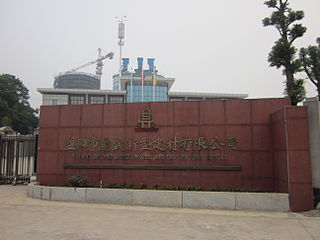This article does not cite any sources .(September 2013) (Learn how and when to remove this template message) |
| Linfeng Town | |
|---|---|
| Town | |
| Chinese transcription(s) | |
| • Simplified | 邻封镇 |
| • Traditional | 鄰封鎮 |
| • Pinyin | Linfeng Zhen |
| Coordinates: 29°53′32″N107°12′52″E / 29.89222°N 107.21444°E Coordinates: 29°53′32″N107°12′52″E / 29.89222°N 107.21444°E | |
| Country | People's Republic of China |
| City | Chongqing |
| district | Changshou District |
| Area | |
| • Total | 55.85 km2 (21.56 sq mi) |
| Population | 36,000 |
| Time zone | China Standard (UTC+8) |
| Postal code | 401249 |
| Area code(s) | 023 |
Linfeng Town (simplified Chinese :邻封镇; traditional Chinese :鄰封鎮; pinyin :Linfeng Zhen) is an urban town in Changshou District, Chongqing, People's Republic of China.

Simplified Chinese characters are standardized Chinese characters prescribed in the Table of General Standard Chinese Characters for use in mainland China. Along with traditional Chinese characters, they are one of the two standard character sets of the contemporary Chinese written language. The government of the People's Republic of China in mainland China has promoted them for use in printing since the 1950s and 1960s to encourage literacy. They are officially used in the People's Republic of China and Singapore.

Traditional Chinese characters are Chinese characters in any character set that does not contain newly created characters or character substitutions performed after 1946. They are most commonly the characters in the standardized character sets of Taiwan, of Hong Kong and Macau, and in the Kangxi Dictionary. The modern shapes of traditional Chinese characters first appeared with the emergence of the clerical script during the Han Dynasty, and have been more or less stable since the 5th century.
Hanyu Pinyin, often abbreviated to pinyin, is the official romanization system for Standard Chinese in mainland China and to some extent in Taiwan. It is often used to teach Standard Mandarin Chinese, which is normally written using Chinese characters. The system includes four diacritics denoting tones. Pinyin without tone marks is used to spell Chinese names and words in languages written with the Latin alphabet, and also in certain computer input methods to enter Chinese characters.



